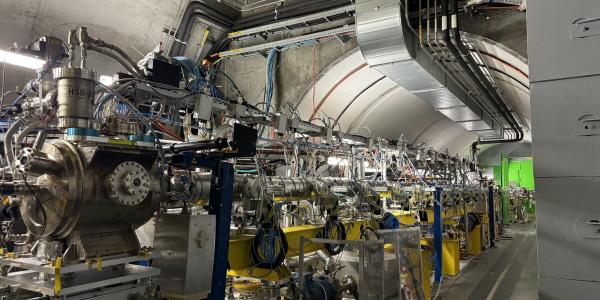
Plasma-based accelerators have demonstrated their ability to accelerate electrons at very high gradients (>100GeV/m). They have a number of niche applications.
The AWAKE experiment, located at CERN, aims at producing high-energy electron bunches (50 to 200GeV) for application to particle physics. Large energy gain is in principle possible by avoiding staging challenges, using a single energetic driver and only one plasma for acceleration. A 400GeV bunch from the SPS with 3e11 protons first self-modulates in a 10m-long plasma, then drives wakefields in an accelerator plasma (10 to 200m long). Self-modulation (SM) is an instability we observe. We can control it and make it reproducible with two seeding methods. We observe its growth and saturation. We can suppress it by imposing a linear density gradient along the plasma. SM is an axi-symmetric mode of beam-plasma interaction. We can also seed the non-axi-symmetric hosing mode, and observe its growth. Under particular conditions, we also observe the early stage of the filamentation instability. We accelerate externally-injected, test electrons from 19MeV to 2GeV. Based on these results obtained with only the self-modulator plasma (see the reference below), we developed a clear plan to reach much higher energies by adding a scalabe-in-length accelerator plasma, and injecting a 150MeV electron bunch from an RF-linac. After the success of these injection/acceleration experiments, we will propose an application to particle physics. We will introduce AWAKE, summarize the main results obtained so far, and describe our plans.
REFERENCES: The AWAKE Collaboration, Phys. Rev. Lett. 122, 054802 (2019), M.
Turner et al., Phys. Rev. Lett. 122, 054801 (2019), M. Turner, P.
Muggli, et al.,, Phys. Rev. Accel. Beams 23, 081302, (2020), F.
Braunmueller et al., Phys. Rev. Lett. 125, 264801 (2020), P. Muggli, J.
Phys.: Conf. Ser. 1596 012008 (2020), F. Batsch et al., Phys. Rev. Lett.
126, 164802 (2021), P.I. Morales Guzmán et al., Phys. Rev. Accel. Beams
24, 101301 (2021), L. Verra et al., AWAKE Collaboration, Phys. Rev.
Lett. 129, 024802 (2022), L. Verra et al., AWAKE Collaboration, Physics
of Plasmas 30, 083104 (2023), T. Nechaeva et al., AWAKE Collaboration,
Phys. Rev. Lett. 132, 075001 (2024), L. Verra et al., AWAKE
Collaboration, Phys. Rev. E 109, 055203 (2024), M. Turner et al.,
submitted (2024), arXiv:2406.16361 [physics.plasm-ph]
About Dr. Partic Muggli

I am the leader of the Future Accelerators Group/AWAKE at the Max Planck Institute for Physics (MPP), in Garching/Munich, Germany. As chair of the Physics and Experiment Board, I am leading the experimental program on the AWAKE Proton-Driven Plasma Wakefield experiment at CERN. I am the spokesperson for the AWAKE Collaboration. I am also member of the Management and Technical Board of the AWAKE program. I am Fellow of the American Physical Society and of IEEE. I am chairing the panel on Advanced and Novel Accelerators within the International Committee for Future Accelerators (ICFA). I received the 2011 Particle Accelerator Science and Technology Award.
Audience:

